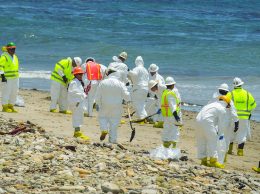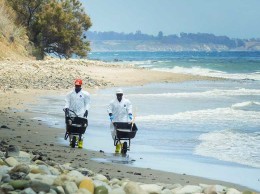Carbon tax right policy for Tri-Counties
By Mike McEachen
As a frequent visitor to Refugio Beach, I was saddened by the oil that spewed out of the underground pipeline operated by Plains All American Pipeline and fouled our beach and coastline.
My family and friends had to cancel our annual Memorial Weekend Refugio Beach campout that we made reservations for six months ago. Soon, my sadness changed to indignation when I realized that it is not possible for the companies who have profited from this pipeline to restore our pristine shoreline to its original condition.
This spill is an example of the costs we all pay for our dependence on fossil fuels. What if there was a way for fossil fuels to begin to pay the costs that they impose on society and the environment, without imposing a raft of regulations, permits, or mandates? By putting a price on dirty fossil fuels, market forces will drive the imperative to reduce greenhouse gas emissions.
An initially low but steadily increasing price would be directly applied on carbon by taxing it at the point of extraction, or by border adjustments for imports and exports. The tax would be revenue-neutral because 100 percent of the proceeds would be returned to the economy in the form of per-capita dividend checks, or alternatively, by 1-for-1 reductions in payroll taxes, thus protecting families and businesses from increased energy costs. It is projected that most households will actually have more disposable income under a carbon fee and dividend.
Over the past few years, support for carbon pricing to create market incentives to replace fossil fuels with clean energy has been growing steadily. Former Secretary of State George Shultz and former Secretary of the Treasury Henry Paulson, Jr., are just two of the hundreds of distinguished economists, statesmen, scientists and executives who have stepped forward to endorse a revenue-neutral carbon tax, or a carbon fee and dividend, as the most powerful way to reduce our dependence on environmentally dangerous fossil fuels while maintaining a strong economy.
A revenue-neutral carbon tax has broad appeal across the political spectrum. Free-market business people like it for its ability to restore market efficiency by capturing external costs, without imposing onerous regulations. Environmentalists understand that direct price signals have been demonstrated to be more effective than caps or mandates in reducing total greenhouse gas emissions throughout the economy.
A study by Regional Economic Models Inc. projects that the U.S. would enjoy both economic and environmental benefits from a national carbon fee and dividend. For example, after 20 years with a carbon fee and dividend in place, GDP is projected to be $1.3 trillion ahead, while emissions will be reduced by 52 percent, compared with a business-as-usual baseline. Our Pacific Coast region, consisting of Washington, Oregon and California, is projected to gain roughly half a million jobs and $30 billion in gross regional product compared to baseline.
A national carbon fee and dividend would bring economic benefits to our Central and South Coast regions. California already boasts the cleanest electricity portfolio in the nation. Our world-class university system provides a steady supply of highly capable and entrepreneurial graduates in relevant fields such as materials science, physics, economics and biology. Due to the urgent need for climate crisis solutions, it is expected that a majority of Californians would support a carbon fee and dividend.
We also have real-world evidence that shows that wherever well-designed carbon pricing programs have been implemented, they have proven successful. Since passing a carbon tax in 2008, British Columbia has seen its emissions drop more than 15 percent compared to the rest of Canada, even while its GDP has grown by 2.8 percent compared to non-taxed provinces.
A common concern about carbon pricing is that it could hamper global trade and thus our export-dependent industries. However, global trade law experts have confirmed that WTO rules allow for border adjustments. For trade with nations that don’t yet have a comparable pricing regime, the U.S. would impose a fee on imports proportional to their carbon footprint, and similarly refund fees to exports. Therefore, our global trade competitiveness would not be handicapped by a national carbon tax.
With all the evidence that is facing us, there is no longer an honest argument for doing nothing to address our fossil fuel dependence and the damage it is causing. Fortunately, we know there is a simple policy that would begin to undo the damage. We just need to provide the political will to make it happen. Our grandchildren will appreciate our efforts.
Mike McEachen is a mechanical engineer who lives in Santa Barbara. He is a volunteer with Citizens Climate Lobby, a non-partisan association of volunteers devoted to advocating for a carbon fee and dividend. He can be contacted at santabarbara@citizensclimatelobby.org.










